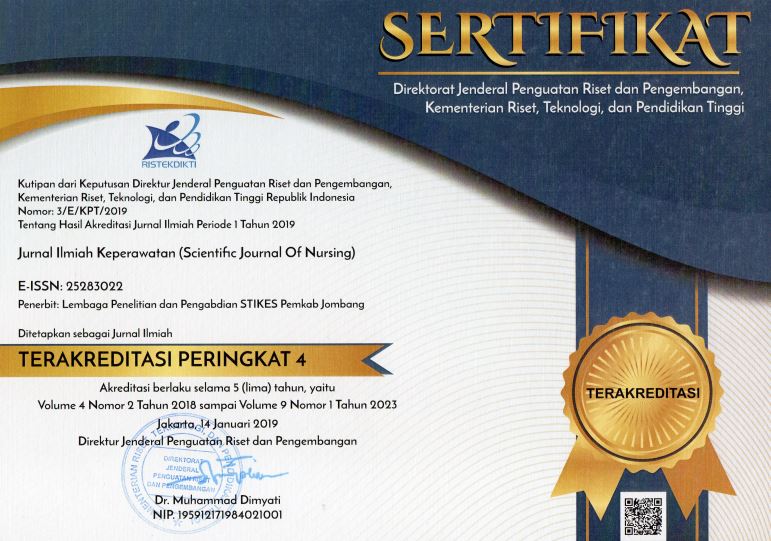HUBUNGAN DUKUNGAN KELUARGA DAN TEMAN SEBAYA DENGAN PILIHAN MAKANAN SEHAT PADA REMAJA
Family and Peer Support Relationships with Healthy Food Choices for Adolescents
DOI:
https://doi.org/10.33023/jikep.v10i2.1930Keywords:
Remaja, Dukungan keluarga dan teman Sebaya, Pilihan makananAbstract
Pendahuluan: Asupan nutrisi yang adekuat melalui pilihan makanan sehat pada remaja sangat dibutuhkan untuk meningkatkan pertumbuhan dan perkembangan yang optimal, sebaliknya asupan nutrisi yang tidak adekuat dapat menimbulkan masalah Kesehatan dan malnutrisi pada remaja hingga dibutuhkan dukungan keluarga dan teman sebaya. Tujuan: Mengetahui hubungan dukungan keluarga dan teman sebaya dengan pilihan makanan sehat pada remaja di siswa SMP Muhammadiyah 36 Jakarta. Metode: Penelitian kuantitatif dengan desain deskriptif analitik menggunakan pendekatan cross sectional. Tehnik pengambilan sampel dengan purposive sampling. dengan jumlah sampel sebanyak 105 remaja. Hasil: Ada hubungan bermakna antara dukungan keluarga dengan pilihan makanan sehat dengan p value=0,001. OR=4.259 menunjukkan bahwa dukungan keluarga yang baik berpeluang 4.259 kali remaja memilih makanan sehat. Tidak ada hubungan dukungan teman sebaya dengan pilihan makanan sehat pada remaja. Kesimpulan: Dukungan keluarga yang adekuat dibutuhkan untuk pemilihan makanan sehat pada remaja sehingga terhindar dari risiko masalah kesehatan dan malnutrisi pada remaja.
Downloads
References
Daly, A. N. e. al. (2022). Considerations for health and food choice in adolescents. Daly, A. N. e. al. (2022). Considerations for health and food choice in adolescents. Proceedings of the Nutrition Society, 81(1), 75–86. https://doi.org/10.1017/S0029665121003827
Ducrot, P. et al. (2022). Food choices among French adolescents. Nutrients, 14, 1–11. https://doi.org/https://doi.org/10.3390/nu14153119
Geuens, M. (2023). Research on influencing factors of food choice and food consumption. Foods, 12, 1–4. https://doi.org/10.3390/foods12061306
Ghaffar, S. A. et al. (2019). Food choices and diet quality in the school food environment: A qualitative insight from the perspective of adolescents. Malaysian Journal of Medicine and Health Sciences, 15(SP1), 16–24.
Harper, K. et al. (2022). Diet quality and contextual factors influencing food choice among adolescents with food security and food insecurity in Baltimore City. Nutrients, 14, 1–18. https://doi.org/10.3390/nu14214573
Hormenu, T. (2022). Dietary intake and its associated factors among in-school adolescents in Ghana. PLoS ONE, 17(5 May), 1–13. https://doi.org/10.1371/journal.pone.0268319
Kementerian Pendidikan dan Kebudayaan. (2019). Gizi dan kesehatan remaja (kedua). Jakarta: SEAMEO RECFON.
Liu, K. S. N., Chen, J. Y., Sun, K. S., Tsang, J. P. Y., Ip, P., & Lam, C. L. K. (2023). Family facilitators of, barriers to and strategies for healthy eating among Chinese adolescents: Qualitative interviews with parent–adolescent dyads. Nutrients, 15, 1–16. https://doi.org/10.3390/nu15030651
Morrison, J. et al. (2023). Eating for honour: A cultural-ecological analysis of food behaviours among adolescent girls in the southern plains of Nepal. PLoS ONE, 18, 1–15. https://doi.org/10.1371/journal.pone.0290405
Mukanu, M. M. et al. (2022). School Food Environment in urban Zambia: A Qualitative analysis of drivers of adolescent food choices and their policy implications. International Journal of Environmental Research and Public Health, 19(1–18). https://doi.org/10.3390/ijerph19127460
Neufeld, L. M. et al. (2022). Food choice in transition: adolescent autonomy, agency, and the food environment. The Lancet, 399, 185–197. https://doi.org/10.1016/S0140-6736(21)01687-1
Rageliene, T., & Gronhoj Alice. (2020). The influence of peers? and siblings? on children’s and adolescents? healthy eating behavior. A systematic literature review Tija. Appetite, 1(48), 19. https://doi.org/https://doi.org/10.1016/j.appet.2020.104592
Rah, J. H., & et al. (2021). The triple burden of malnutrition among adolescents in Indonesia. Food and Nutrition Bulletin, 42(1_suppl),S4–S8. https://doi.org/10.1177/03795721211007114
Unicef Indonesia. (2021). Social and behaviour change communications strategy. Indonesia.
WHO. (2015). Indonesia global school-based student health survey. In Badan Litbang Kesehatan (Ed.), G;obal School -based Student Health Survey (pp. 1–6). Jakarta: Badan Litbang Kesehatan. Retrieved from http://www.who.int/chp/gshs/indonesia/en/
World Food Programme. (2017). Studi kebiasaan makan. Indonesia.
Xu, J. (2022). The roles of family and school Members in influencing children’s eating behaviours in China: A narrativerReview. Children, 9(3), 1–13. https://doi.org/10.3390/children9030315
Published
How to Cite
Issue
Section
Authors who publish with Jurnal Ilmiah Keperawatan (Scientific Journal of Nursing) agree to the following terms:
- Authors retain copyright and grant Jurnal Ilmiah Keperawatan (Scientific Journal of Nursing) the right of first publication with the work simultaneously licensed under a Creative Commons Attribution 4.0 International License that allows others to remix, adapt and build upon the work with an acknowledgment of the work's authorship and of the initial publication in Jurnal Ilmiah Keperawatan (Scientific Journal of Nursing).
- Authors are permitted to copy and redistribute the journal's published version of the work (e.g., post it to an institutional repository or publish it in a book), with an acknowledgment of its initial publication in Jurnal Ilmiah Keperawatan (Scientific Journal of Nursing).









